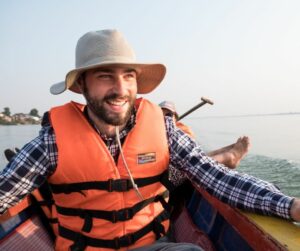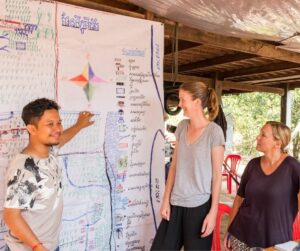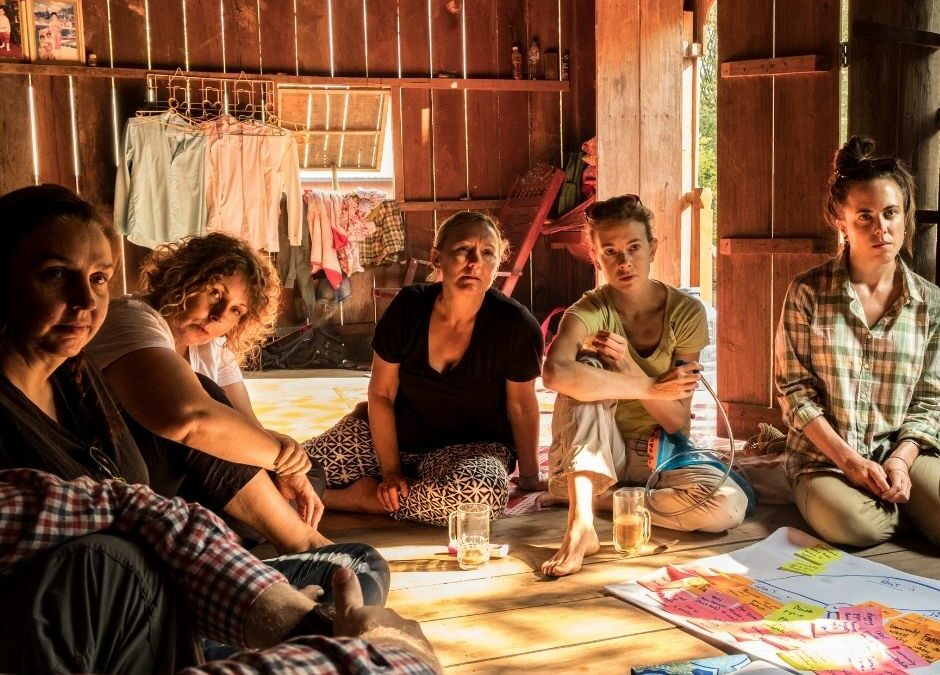EWB Australia pilots its new professional skills development program in three remote Cambodian communities.
Today’s engineers are working within a rapidly evolving global economy and are required to address issues like climate change, technology emergence, automation, urbanisation and poverty alleviation. EWB Australia recognises that traditional engineering roles are changing and that there is a need to develop adaptive, “globally-competent” engineers.
After an internal review of EWB Australia’s training offerings, a strategic, whole-of-organisation approach to training was developed. We have extended our education pathway beyond the tertiary sector and into the corporate sector with a new professional development portfolio. This was seen as one vital step towards achieving our external goal of helping to redefine engineering as a profession making a positive social and environmental impact.

Andreas en route to Koh Dambang
In February/March 2019 Andreas Henschke, mid-career mechanical engineer from WSP, and Leah Sertorio, late-career engineer with Queensland Urban Utilities, were two of eight engineers who travelled to Cambodia for eight days for the Solutions for Sustainable Development Intensive (S4SDI) pilot. After training sessions in Phnom Penh on the fundamentals of human-centred design, sustainable development and the local culture, the team immersed themselves in three remote island communities.
in Cambodia’s Kratie Province. Their goal was to provide technical support to EWB Australia community partner, Cambodian Regional Development Team (CRDT), to improve water access and reliability for the communities.
The S4SDI team learned that the communities were sourcing their water from a recently built CRDT supply system that provided raw water from the Mekong River (originally intended for agriculture, to boost farming production during the dry season). The water supply was mainly being used in households and was making people sick because it was not clean enough for drinking.
The team identified short-term recommendations to improve water reliability and accessibility, and long-term recommendations for data collection, design and implementation support to aid CRDT in future developments of their water supply systems. All findings and relevant knowledge were transferred to CRDT to enable capacity building of CRDT members and Cambodian communities in the areas of water infrastructure construction, management and access to safe and reliable water.
While Andreas’s reason for participating in the program was to give back to community, as well as filling in some gaps in his professional experience in order to apply for chartership with Engineers Australia, he came out with a lot more than he anticipated.
“There were personal and professional benefits,” said Andreas. “I made a good group of friends as well as connections for my engineering career. I also gained a greater understanding of how to approach engineering problems. I see it as incredibly useful for my engineering career in the long term and it has planted a seed to do something in this area in the future.”

Leah (right) investigating Villager Water Use in Koh Tnout
Leah said she joined the program because throughout her career she has “had a strong desire to utilise my technical skills for the benefit of others”. The relatively short timeframe of the program also meant it fitted in well with other professional and personal commitments. Both Leah and Andreas identified a key learning of the program for them was that human-centred engineering means approaching engineering problems with more curiosity and consideration in the early stages.
“I have worked as a professional engineer for over 20 years,” said Leah, “however I had never realised just how limited I was in the way I had learnt in my career how to ask questions. The program demonstrated to me how important it was to seek to understand first—rather than progress straight to solution mode and solving the ‘perceived’ problem—and how important it was to sit in vagueness and uncertainty, despite how uncomfortable this felt, as this space goes against the grain of the engineering mindset. Through trusting the process it surprised me how holistic, feasible, viable and desirable solutions can be borne.” Andreas agreed: “Another learning I got from the program was the whole idea about sustainable development is to not ‘go in and build something’; it’s to enable the communities you are going to visit, to get them to grow and build their own things—whatever is necessary for them—using their own skills internally, rather than relying on external people to go in or external funding from charities.”
After this successful pilot, EWB Australia is evolving the professional program with another pilot in Broome in the second half of 2019. Further programs are also being scoped for other Australian and Pacific locations in 2020.


